Digital engineering is no longer just a buzzword—it’s an essential pathway to innovation. With Ansys 2025 R1, the future of engineering simulation gets even faster, smarter, and more efficient. This latest release brings groundbreaking advancements in AI-driven simulation, GPU acceleration, system-level modeling, and cloud computing, empowering engineers to push boundaries like never before.
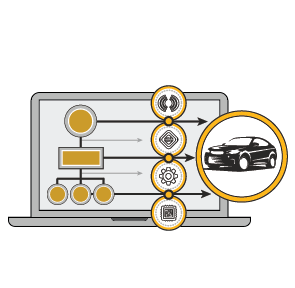
Ansys Digital Engineering: Key to Designing Next-Gen Complex Systems and Products
Ansys is a technology partner for digital engineering. Our market-leading solutions enhance engineering collaboration and bring physics-based simulation insight earlier in development to help accelerate the delivery of entire systems into leading products. Supporting your digital transformation to bring complex systems to life.

Solve System Complexity with Market-Leading Analysis
Ansys brings a model-based systems engineering framework to empower engineers to tackle new levels of complexity. Integrating powerful physics solvers into the digital models that represent these systems brings unprecedented levels of fidelity. Giving teams confidence in their models will reflect reality, reducing reliance on physical prototyping.

The Flexibility to Evolve at the Pace of Technology
Our open ecosystem solutions allow businesses to add the technology they need to their digital engineering ecosystem. Bringing new possibilities in accelerating simulation or exploring new design spaces with a growing range of AI-powered applications. Evolve as your business does by scaling with cloud-based simulation and HPC.

Product Highlights
Ansys 2025 R1 is our latest release designed to empower engineering organizations with cutting-edge tools for rigorous digital design and real-world product delivery. At the heart of R1 are groundbreaking advancements in fundamental physics-based solutions, seamlessly integrated across engineering domains. Leveraging the power of Artificial Intelligence, our enhanced solvers and platform-level tools enable more efficient design exploration and deeper insights, transforming the way teams approach complex challenges.
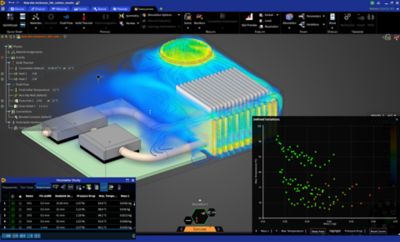
3D Design
Ansys Discovery 2025 R1 introduces powerful new features, enhancing the entire design exploration and simulation workflow. Model preparation is more efficient with features like detecting sweep meshing feasibility and creating custom beams. Accelerate complex electronics cooling simulations with GPU-based automated meshing and expanded electromagnetic capabilities. Finally, take design exploration to new levels and investigate more designs in less time and effort with the ability to burst to cloud and solve thousands of simulations in minutes.
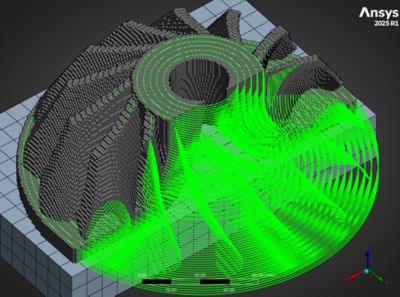
Additive
We are excited to announce the integration of Ansys' advanced simulation technology into Materialise Magics, a strategic partnership poised to transform metal additive manufacturing. This collaboration enhances product quality, reduces costs, and drives innovation by mitigating risks, and predicting and addressing part deformation and thermal stress early.

Autonomous Vehicle Simulation
Ansys AV simulation for 2025 R1 enhances autonomous systems' safety, efficiency, and usability. Key features include accurate 3D sensor placement, IP protection for camera imagers, and standardized interconnects for radar sensor interface. Improved interoperability and connectivity with AVxcelerate Autonomy ensures seamless integration and improved adaptability, driving the autonomous industry forward with robust, secure solutions that meet high safety standards and enhance performance and user experience.

Connect
This release enhances the digital engineering enablers with Materials (Granta) and Simulation (Minerva) data now more readily integrated with CAD, CAE and PLM with an enhanced UX to improve search and export. Enable next generation MBSE with the extended SysML v2 support and model management in the Ansys System Architecture Modeler with deeper integration with Ansys ModelCenter. Ansys optiSLang™ expands its capabilities with new distributed computing options and advanced Algorithms adding flexibility and performance to a customer’s engineering workflow.
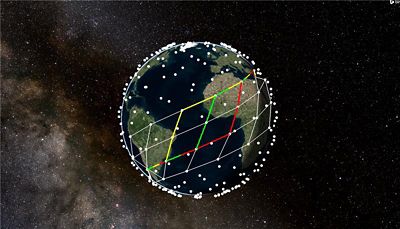
Digital Missions Engineering
Ansys Digital Mission Engineering introduces several notable updates and enhancements for 2025 R1, empowering users to tackle various mission design challenges. These key updates enhance mission design and analysis capabilities, RF modeling, and systems engineering integration to support better the growing complexity and scope of modern aerospace and defense system development.

Digital Twin
Ansys 2025 R1 enhances its digital twin capabilities with hybrid analytics, scaled deployment, and new features for improved flexibility and usability. Key updates include the Ansys Unified Installer, a scriptable Python interface for Reduced Order Models (ROMs), and enhancements to hybrid analytics post-processing. Ansys TwinAI™ now supports SysML v2 snippet export, menu-based help, expanded file export options, and new examples for PyAEDT and PyTwin to streamline development.
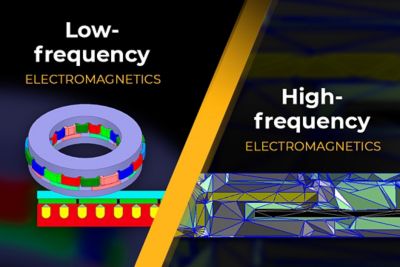
Electronics
Accelerate your time-to-market and drive innovation with new capabilities that boost simulation speed and accuracy while enhancing user experience. The axial-flux machine template enhances meshing accuracy and speed for electric machines. Improved TZR speed import and workflows simplify 3D-IC modeling. Experience a faster A-Phi Eddy current solver for DC-biased frequency domain analysis tailored for power electronics. Enjoy more flexible and accurate system-level simulations, quicker IC design evaluations, streamlined PI analysis workflows, and AI/ML-driven time and memory predictions that optimize performance.
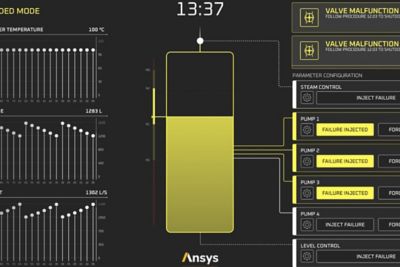
Embedded Software
Continuing the momentum from our last release, Ansys Embedded Software 2025 R1 release takes the innovations one step further. Keeping software safety certification for customers as a primary objective, the new release of Ansys SCADE contains notable improvements for certified/qualified code generation for DO178C and ISO 26262 safety standards and continues to be leader in certification/qualification for automotive and aerospace industries. Scade One latest release delivers a complete workflow for test and introduces PyScadeOne.
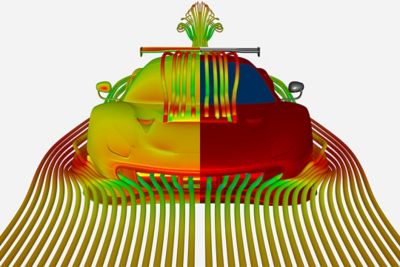
Fluids
Ansys Fluids 2025 R1 continues to deliver critical enhancements to meet our customers' performance and productivity needs. The Fluent GPU solver now supports additional physics, including the FGM combustion model, particle and droplet modeling with the discrete phase model (DPM), surface-to-surface radiation, and more. Finally, advancements across Thermal Desktop, Rocky, and CFX include dramatic performance improvements, new multi-physics integrations, and additional optimization options.

Materials
Ansys Granta 2025 R1 introduces many new features and enhancements, bringing a unified experience for Ansys Granta MI users across CAD, CAE, and PLM platforms. It also includes significant improvements for search and introduces new material data in polymers, electromagnetics, and sustainability within the material libraries, helping engineers and designers be more productive without leaving their preferred engineering tools.
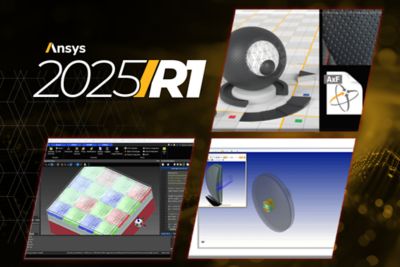
Optics
Ansys Optics has released its 2025 R1 release, focusing on unified multiphysics analysis, streamlined workflows, and improved user experiences. Key updates include stress birefringence in STAR, design for manufacturing - mechanical pivot points (MPVT), Pervasive Insights - Dark Theme, X-Rite AxF support, Python-based API, advanced optical lens design for headlamps, multi-GPU performance and meshing enhancements, and a modern user interface for Lumerical FDTD. These updates aim to improve simulations, accuracy, and collaboration, and solidifying Ansys Optics as a leader in optical simulation and design. The updated software is available on GitHub for easy adoption into simulation pipelines and bespoke GUI development.

Safety Analysis
2025 R1 brings new UX and UI features across the Ansys Safety Analysis product collection to offer an improved way of working and new levels of efficiency. As safety projects become more complex, our solutions aim to evolve with customers' needs. Our model-based safety solution enables users to perform FMEAs faster and more effectively with smarter navigation in the tool, allowing them to quickly update the analysis even as their hardware evolves.
The Digital Safety Manager (DSM) platform now offers customer-defined safety KPIs, fed by live-reported Ansys medini data, to bridge the gap between safety engineer and manager. Make your safety analysis a visible part of the product development process.
Semiconductors
The 2025 R1 release considerably speeds-up almost every semiconductor product, while PowerArtist™ introduces a powerful new methodology for analyzing and fixing glitch power. PowerX™ is a new software product for parasitic debugging of semiconductor power devices, and RedHawk-SC Security™ has partnered with eShard™ to expand side-channel security analytics. RedHawk-SC Electrothermal™ has collaborated with TSMC™ to develop a flow for evaluating thermal manufacturing stresses in 3D-ICs.
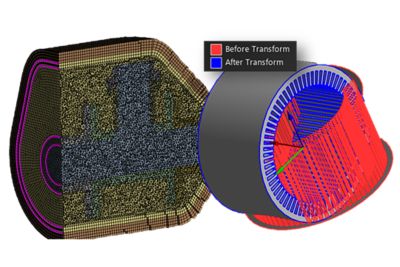
Structures
The 2025 R1 release of Ansys Structures introduces a suite of new features designed to provide holistic advantages to our customers, categorized by product. Ansys Mechanical delivers powerful enhancements in solver capabilities, comprehensive integration for NVH (Noise, Vibration, and Harshness) applications, and advanced tools for material and crack growth analysis. These upgrades empower engineers to handle large, demanding models with improved accuracy, efficiency, and reliability across various industries. Ansys LS-DYNA offers new solvers and methods that accurately describe real-world applications, from gas flows to adhesives and batteries. Ansys Sherlock provides new features centered around Thermal-Mech life predictions for BGA packages, in addition to PySherlock updates with new APIs and the automation of specific workflows.













